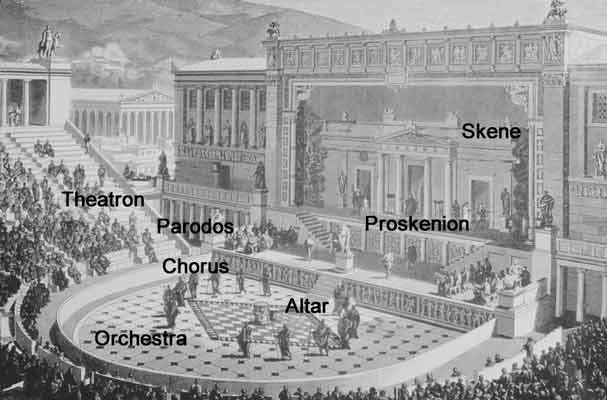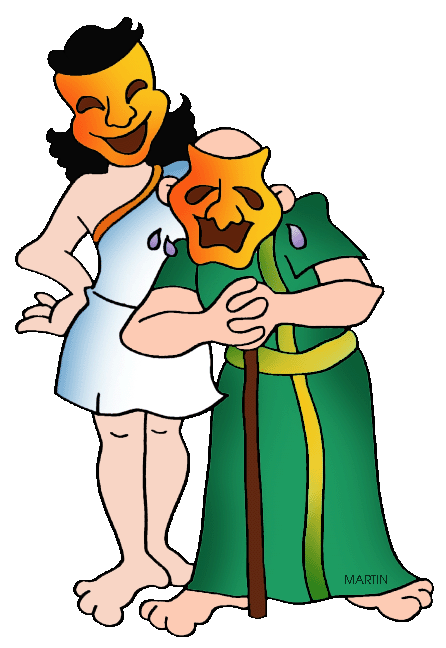
The Origins of Drama
Twenty-five hundred years ago, two thousand years before Shakespeare, Western theatre was born in Athens, Greece.
Between 600 and 200 BC, the ancient Athenians created a theatre culture whose form, technique and terminology have
lasted two millennia, and they created plays that are still considered among the greatest works of world drama.
Their achievement is truly remarkable when one considers that there have been only two other periods in the history
of theatre that could be said to approach the greatness of ancient Athens - Elizabethan England and, perhaps the
Twentieth Century. The greatest playwright of Elizabethan England was Shakespeare, but Athens produced at least five
equally great playwrights. The Twentieth Century produced thousands of fine plays and films, but their form and often their
content are based on the innovations of the ancient Athenians.
READ MORE:THE ANCIENT GREEK DRAMA & THEATRE HISTORY PAGE

Free Presentations in PowerPoint format

The ancient Greeks loved live theatre.
Every town had at least one open air theatre. These theatres attracted
crowds of 15,000 people. Each town bragged about how wonderful their
plays were and how marvelous their actors were.
Every town had at least one open air theatre. These theatres attracted
crowds of 15,000 people. Each town bragged about how wonderful their
plays were and how marvelous their actors were.
The ancient Greeks invented three types
of plays. Tragedies always had a sad ending. Comedies always had a
happy ending. And satires poked fun at real people and events. (In
ancient Greece, it was illegal to poke fun at the gods. Punishment for
mocking the gods was death.) Comedies and tragedies entertained, but a
well written satire could sway public opinion.
of plays. Tragedies always had a sad ending. Comedies always had a
happy ending. And satires poked fun at real people and events. (In
ancient Greece, it was illegal to poke fun at the gods. Punishment for
mocking the gods was death.) Comedies and tragedies entertained, but a
well written satire could sway public opinion.
The Greeks were very competitive. They
had drama contests between towns. Winners were treated with great
respect, nearly as much respect as the Olympic winners.
had drama contests between towns. Winners were treated with great
respect, nearly as much respect as the Olympic winners.
Many Greeks tried to become famous
playwrights. One of the most successful and famous was a Greek named Sophocles.
Sophocles wrote 120 plays! His plays were a popular draw.
playwrights. One of the most successful and famous was a Greek named Sophocles.
Sophocles wrote 120 plays! His plays were a popular draw.
 The
The word theater means a “place
for seeing,” but theater
is more than just a building where
plays are performed. It’s
the whole idea behind what happens
there. Theater is where playwrights
write scripts, directors supervise
rehearsals, set designers and
technical crew work behind-the-scenes,
and the actors perform on stage.
All of these people have an important
role in the theater, but it is
not true theater until an audience
is there to experience it.
Exactly
when theater began is a mystery. Prehistoric
hunters acted out stories about their
hunting expeditions. Ancient Egyptians
performed sacred songs and danced
for their gods in religious ceremonies,
but the idea of theater as dramatic
entertainment came later. Use the
time line above to learn about some
of the important periods and events
in theater history. READ MORE :http://knowitall.org/kidswork/theater/history/index.html
Δεν υπάρχουν σχόλια:
Δημοσίευση σχολίου